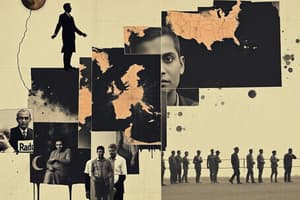Podcast
Questions and Answers
What was the main concern of Muslim leaders and intellectuals regarding the status of Muslims within India?
What was the main concern of Muslim leaders and intellectuals regarding the status of Muslims within India?
- That their culture and identity would be submerged under Hindu majority rule (correct)
- That they would not be able to participate in the Indian Independence Movement
- That they would be forced to adopt Hinduism
- That they would be denied equal rights
Sir Muhammad Iqbal's statement in 1930 was inspired by feelings of narrow communalism.
Sir Muhammad Iqbal's statement in 1930 was inspired by feelings of narrow communalism.
False (B)
What was the importance of separate electorates for Muslims, according to Sir Muhammad Iqbal?
What was the importance of separate electorates for Muslims, according to Sir Muhammad Iqbal?
As an important safeguard for their minority political interests.
The Civil Disobedience Movement started in an atmosphere of _______________ and distrust between communities.
The Civil Disobedience Movement started in an atmosphere of _______________ and distrust between communities.
Match the following individuals with their roles:
Match the following individuals with their roles:
What was the fear of Muslim leaders and intellectuals regarding the dominance of a Hindu majority?
What was the fear of Muslim leaders and intellectuals regarding the dominance of a Hindu majority?
The Pakistan demand was a direct result of Sir Muhammad Iqbal's statement in 1930.
The Pakistan demand was a direct result of Sir Muhammad Iqbal's statement in 1930.
What was the condition for Indian Muslims to stake their all for the freedom of India, according to Sir Muhammad Iqbal?
What was the condition for Indian Muslims to stake their all for the freedom of India, according to Sir Muhammad Iqbal?
According to Sir Muhammad Iqbal, it is the duty of Muslims to _______________ the places of worship of other communities, if need be.
According to Sir Muhammad Iqbal, it is the duty of Muslims to _______________ the places of worship of other communities, if need be.
Flashcards are hidden until you start studying
Study Notes
Dalit Movement
- Dalits demanded reserved seats in educational institutions and a separate electorate to choose their own representatives for legislative councils.
- They believed political empowerment would resolve their social disabilities.
- Dalit participation in the Civil Disobedience Movement was limited, especially in Maharashtra and Nagpur where their organization was strong.
- Dr. B.R. Ambedkar organized the dalits into the Depressed Classes Association in 1930 and clashed with Mahatma Gandhi at the Second Round Table Conference.
- Ambedkar demanded separate electorates for dalits, but Gandhi opposed it, fearing it would slow down their integration into society.
- The Poona Pact of September 1932 gave Depressed Classes reserved seats in provincial and central legislative councils, but they were to be voted in by the general electorate.
Gandhi and Dalits
- Mahatma Gandhi declared that swaraj would not come for a hundred years if untouchability was not eliminated.
- He called the 'untouchables' harijan, or children of God, and organized satyagraha to secure their entry into temples and access to public wells, tanks, roads, and schools.
- Gandhi himself cleaned toilets to dignify the work of the bhangi (sweepers) and persuaded upper castes to give up 'the sin of untouchability'.
Muslim League and Separate Electorates
- Muslim leaders and intellectuals expressed concern about the status of Muslims as a minority within India.
- They feared that the culture and identity of minorities would be submerged under the domination of a Hindu majority.
- Sir Muhammad Iqbal, as president of the Muslim League, reiterated the importance of separate electorates for Muslims as an important safeguard for their minority political interests in 1930.
- Iqbal's statement provided the intellectual justification for the Pakistan demand that came up in subsequent years.
Studying That Suits You
Use AI to generate personalized quizzes and flashcards to suit your learning preferences.




